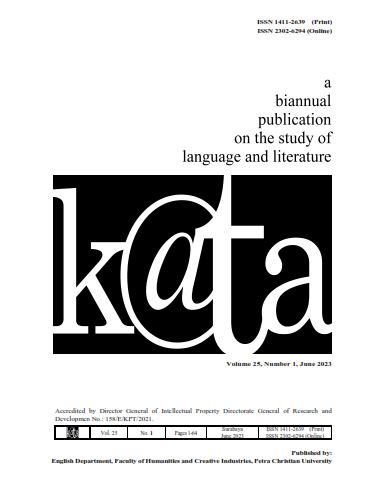Some Womanist Inscriptions in Ebony Reigns’ Song Maame Hwɛ: A Literary Approach
Abstract
Music is a part of life in Ghana. Studying a people’s music brings one closer to understanding them since music and reality are intertwined. Despite this reality, the contribution of popular music to national discourse has not received adequate research attention in Ghana. This paper sets out to study the lyrics of one of the songs of Ebony Reigns (Opoku-Kwarteng Priscilla), a Ghanaian musician who died few years ago. Using the womanist theory, the paper investigates how the tenets of this theory are inscribed in the song, the problems that womanism addresses in the song and their implications to the Ghanaian youth. The researchers conclude from the analysis in the paper that the youth have to use social media with caution; they need to listen to advice from the elderly in choosing life partners and the African woman needs to fight for self-expression and liberation through positive cultural means.
Downloads
References
Achebe, C. (1978). Things fall apart, London: Heinemann.
Acholonu, C. O. (1995). Motherism: The Afrocentric alternative to feminism. Owerri: Afa Publications.
Ademilokun, M. (2013). Discursive features of selected political song texts of the 2011 electioneering campaign rallies in south-western Nigeria. AFFREV IJAH, 2(4), 262-282.
Aidoo, A. A. (1987). The dilemma of a ghost and Anowa. Harlow: Longman.
Allen, L. (2004). Music and politics in Africa. Social Dynamics, 30(2), 1-9.
Asante, M. K. & Mazama, A. (2009). (Eds) Encyclopedia of African religion, California: Sage Publications, Inc.
Alonso, H. (2012). Yip Harburg legendary lyricist and human rights activist. Middleton, Conn: Weslayan University Press.
Bedwiadzi, S. (2016). Sustaining good governance and development in Ghanaian politics: The role of political songs. Ghana Social Science Journal, 13(2), 149-174.
Coker-Appiah, D. & Cusack, K. (1995). (Eds.) Breaking the silence and challenging the myths of violence against women and children in Ghana: Report of a national study on violence. Accra: Gender Studies and Human Rights Documentation Centre.
Decker, A. C. & Baderoon, G. (2018). African feminisms: cartographies for the twenty-first century. Meridians, 17(2), 219-231.
Emielu, A. (2011). Some theoretical perspectives on African popular music. Popular Music, 30(3), 371-388.
Ezeigbo, A.( 2012). Snail-sense feminism: Building on an indigenous model. Lagos: University of Lagos.
Finnegan, R. (2012). Oral literature in Africa, New Edition (online) Cambridge: Open Book Publishers.
Foucault, M. (1990). The History of sexuality, Vol. 1, Harmondsworth: Penguine.
Gunner, L. (2019). Political songs in Africa, https://doi.org/10.1093/acrefore/9780190228637.013.901, accessed on 25/11/2020.
Habib, M. A. R. (2005). A history of literary criticism: From Plato to the present, Oxford: Publishing
Henderson, C. & Gilman, L. (2004). Women as religious and political singers within African institutions: The case of the CCAP Blantyre Synod and political parties in Malawi. Women &Music: A Journal of Gender and Culture, 8, 22-40, DOI: https://doi.org/10.1353/wam.2004.0007
Hogan, B. (2020). Gendered modes of resistance: Power and women’s songs in West Africa. Ethnomusicology Review, https://ethnomusicologyreview.ucla.edu, pp. 1-12.
Juslin, P. N. (2005). From mimesis to cartharsis: Expression, perception, and induction in music. In D. Miell, R. MacDonald and D. J. Hargreaves(Eds) Musical Communication (pp.115), Oxford, UK: Oxford University Press.
Khullar. P. (2018). Difference between code mixing and code switching, http://languagelingustics.com/2018/02/06/difference-code-mixing-code-switching-in-linguistics.com, accessed on 29/02/2020.
Kolawole, M.E.M. (1997). Womanism: African consciousness, Princeton, NJ: Africa World Press....
Kunzler, D. & Utah, R. (2018). Mr. President: Musical open letters as political commentary in Africa, Africa Today, 59(1), 89-113.
Madden, R. (2009). The historical and culture aspects of Jamaican patois, https://debate.uvm.edu./dreadlibrary/Madden.htm, accessed on 29/02/2020
Markwei, E. D. & Appiah, D. (2016). The impact of social media on Ghanaian youth: A case study of the Nima and Maamobi communities in Ghana. The Journal of Research on Libraries and Young Adults, 7(2),1-26.
Nkealah, N. (2016). (West) African feminisms and their challenges. Journal of Literary Studies, 32(2), 61-74, DOI:10.1080/02564718.2016.1198156.
Nketia, J. H. (1975). The music of Africa. London: W. W. Norton.
Nnaemeka O. (2003). Nego-feminism: Theorising, practising and pruning Africa’s way. Signs: Journal of Women in Culture and Society, 29(2), 357-385.
Omidiora, O., Ajiboye, E. & Abioye, T. (2020). Political communication and popular literature: An analysis of political jingles in Nigerian electoral discourse. Journal of Creative Communications, 15(2), 194-208. DOI: 10.1177/09732586/9886/61.
Ogunyemi, C. O. (1985). Womanism: The dynamics of the contemporary Black female novel in English. Signs: Journal of Women in Culture and Society, 11(1), 63-80.
Ogundipe-Leslie, M. (1994). Recreating ourselves: African women and critical transformations. Trenton, NJ: Africa World Press.
Onyebadi, U. (2018). Political messages in African music: Assessing Fela Anikulapo-Kuti, Lucky Dube & Alpha Blondy. Humanities, 7(129), 1-19.
Opara, C. 2005. On the African Concept of Transcendence: Conflating Nature, Nurture and Creativity. Journal of Philosophy and Religion, 21(2), 189-200.
Opoku-Kwarteng, P. (2017). Maame Hwɛ, https:// glammynews.com/2017/12/lyrics-ebony, accessed on 29/02/2020.
Ransom, P. F. (2015). Message in the music: Do lyrics influence well-being? Master of applied positive psychology (MAPP) capstone projects 94, https://repository.upenn.edu/wapp-capstone/94.
Steady, F. C. (1981). The Black woman cross-culturally: An overview, in The Black woman cross-culturally, Edited by Filomina Chioma Steady, 7-41, Rochester, VT: Shenkman Books.
Tyson, L. (2006). Critical theory today: A user friendly guide. London: Routledge

This work is licensed under a Creative Commons Attribution 4.0 International License.
This work is licensed under a Creative Commons Attribution License


















